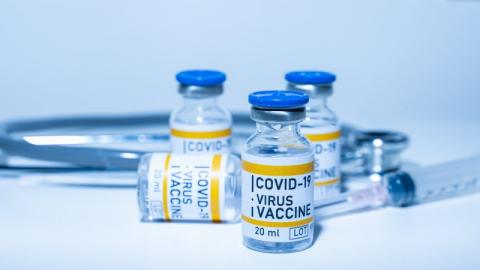
The European Commission aims to ramp up production of COVID-19 vaccines through “voluntary” sharing of know-how among pharma companies, EU sources said, emphasising that patents are not an obstacle to do that.
“What is most needed now, beyond developing vaccines, is the ramping up of manufacturing of vaccines,” said a source at the European Commission, which coordinates the joint purchase of vaccines at EU level.
“And the best way of achieving that is by disseminating the technology and know-how of those who developed the vaccines through licensing arrangements,” the source told EURACTIV.
A row with British-Swedish pharmaceutical AstraZeneca over delayed deliveries of vaccines has derailed vaccination programmes across the EU, causing public anger all over the bloc.
In order to speed up production, some EU lawmakers have called for radical measures such as suspending patents. But others say that such a move amounts to expropriation and could create a dangerous precedent.
Last week, a group of socialist EU lawmakers sent a letter to the European Commission urging the EU executive to explore ways of suspending patents for COVID-19 vaccines, calling it a “moral imperative”.
But the European Commission source emphasised that the intellectual property system, with its checks and balances, does not stand in the way of these efforts. Rather, it is part of the solution, the Commission believes.
“Intellectual property is a key factor in providing a framework that enables these arrangements. Voluntary, cooperative arrangements, including public-private partnerships, are the best guarantee of rapid expansion of safe and effective vaccines production,” the sources added.
The EU is currently exploring ways to increase manufacturing of COVID-19 vaccines by turning to the domestic EU pharma industry collaboration.
“So, Sanofi offering its manufacturing capacities for Pfizer, Novartis doing the same, Bayer will be producing the CureVac vaccine once it is approved,” said Nathalie Moll, the director-general of the European Federation of Pharmaceutical Industries and Associations (EFPIA) who spoke to EURACTIV in a recent interview.
The countries ‘in need’
However, when it comes to poor countries that do not have access to COVID-19 vaccines, the EU executive is ready to discuss several patent options in the framework of the World Trade Organisation (WTO).
“WTO rules are already flexible enough to address problems in the licensing of vaccines technology and know-how, including through the granting of compulsory licences without the patent owner’s consent which can be fast-tracked in emergencies such as the current pandemic,” the sources said.
The EU source also stressed that compulsory licences could also be granted for export to countries with no or insufficient manufacturing capacity.
“These flexibilities under WTO rules are legitimate tools to use for the countries in need, if other solutions are not forthcoming.”
“The EU stands ready to actively contribute to an open and comprehensive dialogue with all WTO Members to explore how the multilateral rules-based trading system can best support universal and equitable access to COVID-19 vaccines and treatments,” the Commission source concluded.